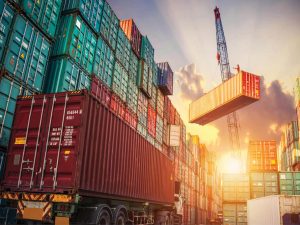Kamal Jain, Director, Cargomen Logistics said, “India has immense potential to emerge as a global transshipment hub given its strategic coastline and proximity to major trade routes. Key strategies include developing deep-draft ports like Vizhinjam and Galathea Bay, simplifying cabotage policies, enhancing port connectivity and creating efficient Free Trade Zones. Robust digital infrastructure, streamlined customs processes and competitive tariffs are essential. India is making progress with initiatives like PM Gati Shakti, port modernisation and the push for coastal shipping, but we need faster execution and global partnerships to match hubs like Dubai and Singapore.”
Read More »‘Push for Free Trade Warehousing Zones is a positive indicator of growth’
Vipin Vohra, Chairman, Continental Carriers said, “India has immense potential to become a global transshipment hub like Dubai or Singapore, backed by its strategic location, coastline and growing manufacturing base. However, achieving this requires focused policy reforms—streamlined customs processes, modern port infrastructure, improved multimodal connectivity, supportive regulatory frameworks like a unified national logistics policy and enhancing capacity through off-airport cargo hubs. Greater private sector participation and global partnerships can further catalyse growth. Initiatives like Gati Shakti, Sagarmala and the push for Free Trade Warehousing Zones indicate movement in the right direction. With sustained execution and stakeholder alignment, India is well poised to emerge as a major transshipment and logistics hub.’
Read More »‘India offers competitive price & simple regulations to facilitate smooth logistics trade’
Amit Tandon, MD Asia Shipping India said, “India is making great progress in becoming a global transhipment hub, aiming to rival major players like Singapore and Dubai. The Vizhinjam International Seaport, which kicked off operations in December 2024 is an important part of it. With its deep draft of over 18 meters, it’s already handling major vessels and processed 733,000 containers, signaling its potential to capture India’s 4.6 million TEUs of transshipment cargo—most of which currently flows through foreign ports. We have to give credit to the government’s Maritime India Vision 2030 which is driving this transformation, with plans for deepwater ports like Galathea Bay and Vallarpadam. Better roads and freight corridors are also boosting connectivity, making these ports more attractive to global shipping lines. To compete, India is offering competitive pricing and simpler regulations, taking cues from Singapore’s efficiency and Dubai’s business-friendly vibe. While there are challenges like regulatory tweaks and stiff competition, the outlook is bright. Vizhinjam alone could generate massive revenue and jobs by 2028. Lets just say, India’s on track to reshape maritime trade and claim its spot on the world stage.
Read More »‘Approx 30% cargo moves via freighters, rest travels in pax bellies, highlighting need for dedicated freighters’
Balagopal Balachandra, National Head – Air Freight, FEI Cargo said, “India is at the crossroads of global trade; will we emerge as a global transhipment powerhouse. The opportunity is ours—but are we bold enough to seize it? The strategic significance of transshipment – the process of transferring cargo from one vessel or airline to another at an intermediate port/ airport, plays a critical role in global trade. Countries that establish themselves as transshipment hubs benefit from increased trade volumes, enhanced revenues and strengthened economic linkages. For India, the potential to become a transhipment hub is particularly appealing given its geographical proximity to major global shipping lanes and its growing status as a major economic powerhouse. Cargo volumes are growing 7– 9 per cent CAGR, targeting 10 MTPA by 2030. Approximately 30 per cent of cargo moves via freighters and rest travels in passenger aircraft holds, highlighting the need for more dedicated freighter capacity. The current over-reliance on passenger belly space is outdated for a $5 trillion economy in the making. For India to realize its ambition of becoming a transhipment hub it requires more than new terminals, a multi-pronged, coordinated strategy is essential – this includes addressing cost and efficiency issues, improving hinterland / Inter-airport connectivity, fostering public-private partnerships to attract investments, unified cargo community systems (CCS), multimodal integration required for seamless cargo transfers, infrastructure remains concentrated at major airports (delays at Tier‑II/III hubs), last‑mile connectivity issues, regulatory bottlenecks in customs, and need for expanded road–rail corridors. Leveraging India’s domestic market potential could further enhance its position as a key player in the global logistics landscape. India does not lack ambition—it lacks alignment. The vision is clear but now is …
Read More »‘Address cost issues, foster PPPs, get foreign investments to make India cargo hub’
Sunil Kohli, Managing Director, Rahat Cargo said, “India is undoubtedly equipped with huge potential towards achieving its objective of being a global cargo hub since it does have an ideal geographical location coupled with a growing economy and is relentlessly heading to improve its infrastructural facilities with accelerated logistical advantages. The trade further needs to enhance its airport facilities with efficient operations apart from developing dedicated transshipment hubs. However, despite its potential, India faces several challenges in becoming a competitive transshipment hub, the primary obstacle being the high cost of port operations compared to regional competitors. Further, Indian ports often grapple with issues like inefficiencies in customs clearance, inadequate connectivity, and congestion, which undermine their preferences. For India to realize its ambition of becoming a transhipment hub, a multi-pronged strategy is essential. This includes addressing cost issues and fostering public-private partnerships to attract investments. The government too needs to introduce liberal policies by reducing avoidable governmental formalities with a view to attract the stakeholders in establishing India as a global transhipment hub.
Read More »Amazon expands express deliveries, extends agreement with Amazon
Cargojet has extended its Air Transportation Services Agreement with Amazon Canada Fulfilment Services to boost global operations. The new contract allows for an additional four years of operations until 31 March 2029. Amazon will also have the option to renew the contract until 31 March 2031. “This multi-year Contract underscores Cargojet’s role in Amazon’s logistics network. At the heart of our success is a dedicated Cargojet team that makes it happen every single day,” said Cargojet executive chairman Ajay Virmani. Mississauga, Ontario-headquartered Cargojet has been working with Amazon for over five years now. Amazon utilises Cargojet’s overnight air network and charter aircraft services to move packages from Amazon facilities to other Amazon or last-mile carrier locations before final delivery to customers.
Read More »‘Expand multimodal hubs, speed up land acquisition for growth’
Amit Tandon, MD, Asia Shipping India said, “To make India a global leader in cargo logistics, we need bold yet practical reforms to build on the solid foundation laid by the National Logistics Policy and PM Gati Shakti. Our logistics costs, hovering at 13-14% of GDP, are still too high compared to Singapore at 7.5%. Expanding multimodal hubs and speeding up land acquisition for projects like Dedicated Freight Corridors will make a major difference. We can’t overlook the workforce. A dedicated skilling mission under Skill India could train millions in modern logistics tech, empowering the sector. Simplifying customs, harmonising state and central regulations, and countering global trade barriers will further boost competitiveness.”
Read More »Skyways Air Services files IPO papers to raise funds
Skyways Air Services has decided to tap capital markets to raise funds via IPO for the purpose of debt reduction, and working capital requirements. The initial public offering (IPO) will comprise of fresh issue of 3.29 crore equity shares, and an offer-for-sale (OFS) of 1.33 crore shares by existing shareholders. Promoters Yashpal Sharma and Tarun Sharma will be offloading 95.8 lakh shares, and other shareholders – Himanshu Chhabra, and Rohit Sehgal selling 18.66 lakh shares and 18.86 lakh shares, respectively in the OFS. The air freight forwarder that competes with listed peers like Delhivery, TVS Supply Chain Solutions, and Mahindra Logistics may consider fund raising by selling 62.5 lakh shares in the pre-IPO round, which is a part of fresh issue.
Read More »‘E-commerce has enhanced EXIM trade of raw materials & finished goods’
Vineet Agarwal, President, CJ Darcl Logistics said, “With a huge focus on establishing India as a ‘global manufacturing hub’ the manufacturing sector has significantly enhanced the movements of raw materials and finished goods across the domestic as well as international borders. Complementing this is the e-commerce sector which has led to the surge in deliveries across Pan India. Lastly, the construction and infrastructure development industry is also witnessing remarkable growth with the government’s ongoing initiatives to develop a robust infrastructure in India.”
Read More »Continental Carriers signs MoU to enhance cargo ops
TNVS, an affiliate of Continental Carriers Group, and Sonovision, an Ortec Group company signed MoU to mark the beginning of an exciting journey to establish a Joint Venture (JV) in India. The MoU was formalised during the prestigious Paris Air Show, setting the stage for a strong international collaboration aimed at transferring high-end technical capabilities to India—especially in the field of MRO support, Ground Support Equipment (GSE) and Jigs & Tools manufacturing and specialised mechanical/electromechanical assemblies for the aerospace and defence sectors. This proposed JV envisions fostering innovation, excellence, and indigenous capabilities while aligning with the strategic imperatives of “Make in India” and global supply chain resilience. Sonovision, a member of the Ortec Group-France, brings a legacy of excellence in- Aerospace technical documentation, Engineering, cutting-edge mechanical and system design & manufacturing. Continental Carriers-India, through its affiliate TNVS, adds unmatched expertise in-specialized logistics and supply chain operations, strong domestic industrial partnerships and Infrastructure-ready capabilities across India Together, we’re looking forward to a transformative journey that merges deep-rooted global knowledge with India’s dynamic industrial landscape.
Read More » Cargo Breaking News
Cargo Breaking News








